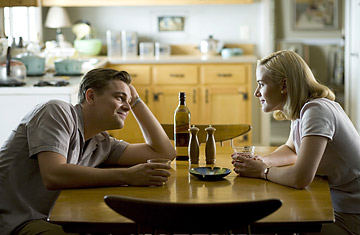
By the time Richard Yates published Revolutionary Road in 1961, its characters, attitudes and settings were already on their way to becoming clichés, and the passage of almost a half century, as the dreadful new movie by Sam Mendes (based on a screenplay by Juston Haythe) proves, has not freshened this deeply lugubrious tale.
Frank Wheeler (a miscast Leonardo DiCaprio) commutes from the suburbs in his fedora, narrow tie and Brooks Brothers suit, consumes copious amounts of cigarettes and booze, hates his job, and has a wan little affair with one of his coworkers. He is under the impression that he deserves better but offers no proof of either the talent or the energy that might move him off his gray flannel treadmill. His wife, April (Kate Winslet), once dreamed of being an actress but has settled down to motherhood, anomie and a cockamamie scheme of uprooting the family to Paris, where she would support them all and Frank would — well, you know — find himself, apparently by sitting around cafés in a black turtleneck and discussing existentialism.
This does not happen, largely because Frank almost accidentally proves himself useful to his corporate masters, which leaves April moodily idle in their little house on Revolutionary Road, trudging toward tragedy. You can see that tragedy developing almost from the first frame of this hermetically sealed-off movie, which shows us little of suburban life or, for that matter, of corporate life in Manhattan, neither of which, if memory or Mad Men serves, were as lifeless or witless as this movie makes them out to be.
At the time Yates wrote his novel, the literature of our discontent, both fictional (The Man in the Gray Flannel Suit) and factual (The Organization Man), crooned compassionately about middle-class "conformity," seeing a generation prematurely worn down and silenced by the Great Depression and World War II and thus (perhaps justifiably) eager for adventureless prosperity. In this sense, Frank and April are less exemplars of man's ineluctable fate than just the numb and unlucky victims of a passing moment in time. Yet neither Yates' novel nor this movie locates Frank and April in a historical continuum; though both allude to the past that dulled these characters, they remain dim about the unrushing future (richly hinted at in many events of the late '50s) that would soon shake the American soul. Two years after Yates published, Kennedy was assassinated, a mere seven years later 1968 was upon us. And the great chroniclers of American middle-class angst, the likes of Philip Roth and John Updike, had their unshakable subject.
I have no idea why Yates' novel has had so many writerly devotees. (I am obviously not one.) Nor do I have any idea why it has been under option to a variety of moviemakers almost from the moment it was published. Maybe it has something to do with its sobriety, its earnestness, the conviction it conveys that anything this mawkish must be good — or at least good for you. Finally, I do not understand why, if you are finally going to adapt this novel for the screen, you would entrust the project to a couple of Englishmen like Mendes and Haythe. True, the former did American Beauty, which had a cynical, murderous energy about it, and a view of contemporary suburbia that a bright fellow could pick up in a few visits. But the middle-class American 1950s requires something less glumly studied, something freer and richer in melodramatic surprise.
That may be why this film is so distant and unfelt, even in its by-the-numbers art direction. It needs waywardness, spunk and surprise, a sense of life not being lived by dully fated figures but by people struggling — sexily, ironically at the very least, with some awareness of their alternatives — against a preordained end. These are things Mad Men, to again revert to that convenient example, is good at in its cheesy, delicious way. For an inconvenient example, you might take a look at Douglas Sirk's movies, made just as Yates was grinding away at his novel. Oh, the sobbing and suffering the likes of Jane Wyman and Lana Turner endured in those movies, but it was both entertaining and instructive to watch them wrestle their dreary zeitgeist to a draw. Maybe they weren't entirely real or truthful. But neither is Revolutionary Road.